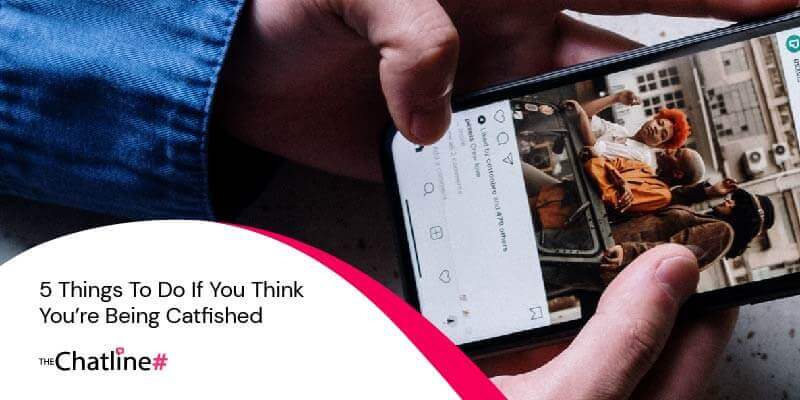Long before the age of digital communications, our ancestors fell in love with their classmates, next-door neighbors, and people within a ten-mile radius. Despite having limited options, their dating game was relatively safe compared to ours.
Nowadays, there are a wide range of channels available to find love, including social media, online dating apps, and phone dating. Phone dating, in particular, is a fantastic channel for finding love and building meaningful bonds with people. It allows people to make connections with others at great distances – an advantage that our ancestors could only dream of. However, with these convenient dating channels come a new danger: impersonification and scams, which our ancestors never had to worry about.
Are you worried about falling victim to deceptive dating frauds, especially the most common one, catfishing? In this article, we’ll explore what catfishing really means, the red flags you should watch out for, and the actions you can take if you suspect that you’re being catfished.
What Catfishing Is

These days, the term “catfish” is everywhere, and it has happened to many people who have tried to establish meaningful relationships over the phone. But what is catfishing? How did it start? What potential dangers does it entail? Could you become a victim of catfishing?
Long before the term “catfish” existed, many people were already practicing this scam, pretending to be someone they’re not with the purpose of extracting personal identity and money from a victim, similar to the email scam called “phishing”. However, in recent times, the catfishing fraud has made its way into relationships.
Catfishing is the act of creating a fictional persona or pretending to be someone else to lure someone they’ve never met into being in a relationship with them. A “catfish” may steal someone else’s photos, videos, or personal information to form a fake identity.
It all started with Nev Schulman’s 2010 documentary movie “Catfish,” which coined the popular term. The documentary film “Catfish” is the first-ever movie that brought the phenomenon to the world’s attention.
In the movie, a “catfish” named Angela pretends to be Aimee Gonzales, a professional model and photographer whom she had never met, to lure a photographer named Nev into a relationship with her. To make her fake identity more convincing, she stole Aimee’s photos to build a fake Facebook profile.
At the same time, she’s also running 15 more fake Facebook accounts. According to Angela, she does this to take her mind off the confines of her failing marriage, in which she is a mother of two disabled children.
The “catfish” term itself comes from an analogy made by Vince, Angela’s husband. He noted that when transporting small fish overseas, ferocious and frightening catfish are placed in the same tanks to keep the smaller fish alert and prevent them from dying.
Vince then remarked that, like the small fish in the tanks. We should remain constantly vigilant about who we are talking to over the phone, to avoid finding ourselves victims of these types of predators.
10 Signs Your Phone Date Is Lying About Who They Are

Identifying a catfish can be especially difficult, even when it’s right in front of you, especially once you start developing feelings for them. As you become fond of them, your emotions can take over your reasoning, making it hard for you to think clearly. Your heart may deceive you into believing they are real, causing you to overlook suspicious signs.
However, the world can be a cruel place, and anyone can fall victim to catfishing, including you. It’s important to remain vigilant of the red flags to help you get rid of catfishers before it’s too late.
To avoid being catfished, here are 10 signs that your phone date might not be who they say they are:
1. The relationship develops rapidly.
A “catfish” will often try to rush things in order to achieve their goal of luring you into a relationship with them. If someone you’ve been talking to for just a few days over the phone expresses interest in being exclusive, don’t be flattered – be wary.
2. They seem too good to be true.
Did you feel like you hit the jackpot when you met someone who seems like they’re exactly the man or woman of your dreams? If they appear to be incredibly handsome, smart, talented, funny, and have a high-paying job, chances are they may not be real. It’s unlikely that someone could be so perfect in every way. After all, if they are truly that perfect, why would they even be looking for a partner?
3. They refuse video calls.
It’s normal for someone to refuse a video call once due to being busy. However, if you’ve never had a video call with them and they keep declining your requests and giving a different set of excuses, it’s suspicious. If you’ve never had a video call with this person, we highly advise you to have one as soon as possible.
4. They don’t send selfies.
In today’s era, sending selfies has become a normal part of our daily communications. When you send a selfie, it’s typical to expect one in return. If the person you’re dating online consistently refuses to send a selfie, it’s a major red flag. Additionally, if their photos seem too professional or staged, it’s possible that they may have stolen them from someone else.
5. They’re not active on social media.
Creating a fake Facebook profile is easy, but it’s much harder for a fake account to acquire friends and followers. If someone’s Facebook profile has few friends, no tagged photos, and no posts with friends commenting on it, it’s a red flag that the profile may not be genuine. A common excuse that a “catfish” may use is claiming that they don’t really use social media. While this may be a common excuse, it’s important to account for it as a sign.
6. Their stories don’t add up.
Whether a “catfish” is trying to win your heart or extort your money, they are skilled at pulling on emotional heartstrings. However, no matter how good a “catfish” is at making up stories, they often struggle to make them sync with each other. This is likely because they tell so many lies that they often forget the little details. Pay attention to those details.
7. Your social circle seems suspicious of them.
If your family and friends seem to be particularly concerned about your phone date’s identity, it’s important to ask them why they feel that way. Their opinions may shed some light on the situation. When you’re getting emotionally attached to someone, it’s easy for your judgment to become clouded by your feelings.
However, the people around you can see things clearly, and if they think something is off, you should consider their thoughts. While you don’t always need to listen to your family and friends when it comes to your love life, if they’re suspicious of your love interest, there’s usually a reason behind it.
8. It’s unclear what they do for a living.
One day, your online date may claim to work in digital marketing, and the next day they may say something entirely different. They never disclose specific details about their work, and you don’t even know their position or the company they work for. All you know is that their job requires them to travel all around the world, and they’re never close enough to meet you in person. Funny, isn’t it?
9. They ask for money.
There are two types of “catfish”: those who ask for money and those who lure you into a relationship. But the worst kind is someone who does both. Scammers have become smarter and know it’s easier to extort money from someone who’s emotionally attached to them.
One thing is for sure: you should never give money to someone you don’t know well or haven’t met in person. While you may want to offer a helping hand, it’s important to be cautious and ensure that you’re not enabling a predator.
10. They avoid meeting in person.
Yesterday, they rejected your request to meet in person because they were ‘too busy with work’. Today, they stood you up because they were ‘not feeling well’. You’ve probably heard every reason why they can’t meet. It’s not a problem if it happens once, twice, or even three times, but if it happens every single time, something’s definitely off.
5 Things to Do if You Suspect Someone Is Catfishing You

Now that we have discussed the signs that your phone date may be lying about who they are, you have probably figured out whether the person you are talking to is real or fake. If it’s the latter, here are some actions you can take if you think you are being catfished:
1. Check their social media account.
While there are legitimate people who are not very active on social media for some reason, even those who are not into social media still have at least a few friends or followers who can vouch for their identity. Fake social media accounts are easy to spot. The fewer engagements and interactions there are on a profile, the higher the chances that it’s fake.
For instance, if all they have on their profile are photos of themselves and nothing with other people they know, it’s likely that it’s a sham. Also, if they claim not to have any social media profiles, it’s definitely a red flag, as almost everyone has at least one.
2. Randomly ask for a selfie.
Here’s a little trick to verify your phone date’s identity: ask them what they’re up to, and when they tell you, request a quick selfie. If they’re caught off guard, they may not be able to send you anything, which could be a red flag. However, if they do send a selfie doing what they claimed, don’t let your guard down just yet.
Professional catfishers often keep a stack of photos of the person they’re pretending to be for emergency situations like this. They may even have a photo ready to send before they tell you what they were doing. It’s important to remain vigilant.
3. Do a reverse image search on their pictures.
Google is a useful tool that can help you verify someone’s identity when building relationships online. A simple reverse Google image search can reveal whether someone is using fake photos or not. Here’s how to do it:
- Go to images.google.com.
- Click the camera icon inside the search bar.
- Either upload the image from your hard drive or drag an image from another window.
If the photo appears anywhere else on the internet, especially in the profile of the person they’re pretending to be, it’s evidence that the person may be a catfish.
4. Trust your instinct and cut off communication.
If there’s any part of your gut that tells you something is off, you’re probably right. When your intuition sends you a message, especially when several red flags are present, it’s time to trust your instincts and stop communicating with your phone date.
Consider blocking their phone number and all their social media accounts. Doubting your partner constantly can prevent you from being truly happy in a relationship. Remember that you’re not at fault for being suspicious, and you have the right to protect yourself from potential harm.
5. Report the catfish and pursue legal action.
While pursuing legal action against a catfish can be difficult due to their unknown identity, it is possible with the help of experienced investigators. To increase the chances of success, provide as much information as possible about the catfish.
Be prepared to put in time and effort for an extensive legal process. It may take a while, but catching a predator and preventing them from preying on others makes it worthwhile.
However, not everyone will choose to take this route. The decision to pursue legal action depends on the extent of your involvement. If the catfish extorted a significant amount of money or endangered your safety, it’s best to proceed with the lawsuit.

